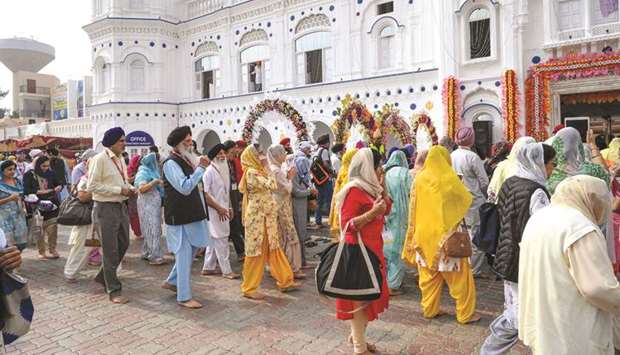A corridor that will allow Sikhs to cross from India into Pakistan to visit one of the religion’s holiest sites is set to open tomorrow, with thousands expected to make a pilgrimage interrupted by decades of conflict.
Indian Prime Minister Narendra Modi will see off the first group of pilgrims, and they will be welcomed by Prime Minister Imran Khan at the shrine marking the grave of Sikhism’s founder Guru Nanak at Kartarpur, just 4km inside Pakistan.
The Kartarpur Corridor marks a rare example of co-operation between the nuclear-armed rivals, who have fought three wars since independence from Britain in 1947, and in February conducted tit-for-tat air strikes after a suicide bombing killed 40 Indian troops.
The deal allows for up to 5,000 pilgrims a day to cross a secure corridor and bridge between the two countries, leading directly to the grave of Guru Nanak.
“They are very excited,” custodian of the Kartarpur shrine Ramash Singh Arora told AFP yesterday, saying that he hopes the initiative would pave the way for similar access to other Sikh sites in Pakistan. “If you look at the history, the foundation of Sikhism is from Pakistan.”
In the months leading up to the opening, Pakistan employed hundreds of labourers to spruce up the shrine, including building a border immigration checkpoint and a bridge, as well as expanding the site’s grounds.
The opening comes just days ahead of the Guru Nanak’s 550th birthday on November 12, which is marked with celebrations by millions of Sikhs around the world.
“For over 70 years, pilgrims haven’t had the chance to cross over, to come over, and that is just ... it’s just ... it’s going to be a really emotional moment,” said Karan Deep Singh, a pilgrim from Malaysia.
Others hoped the corridor would help mend ties between the rivals after years of hostility.
“It should improve and I’m hoping that it will improve. Definitely. Because the goodwill is oozing,” said Bhajan Singh Grewal from Australia.
The Sikh faith began in the 15th century in the city of Lahore, which is now part of Pakistan, when Guru Nanak began teaching a faith that preached equality.
There are an estimated 20,000 Sikhs left in Pakistan after millions fled to India following partition in 1947 that sparked the largest mass migration in human history and led to the death of at least 1mn people.
Meanwhile, Pakistan’s Foreign Office has said that more than 10,000 Sikhs from India and other parts of the world will attend the inauguration of Kartarpur Corridor to be performed by Prime Minister Khan tomorrow.
At his weekly news briefing in Islamabad yesterday, Foreign Office spokesperson Dr Mohamed Faisal said that under the 1974 agreement with New Delhi regarding religious pilgrims, about 5,000 pilgrims will come from India, whereas Pakistan’s missions abroad have issued the same number of visas.
He said that the Sikh pilgrims from different countries, including Canada, Britain, the US, Singapore, Malaysia, Kenya, Uganda, Tanzania, New Zealand, and Australia will attend the inauguration ceremony.
Faisal said that Kartarpur is a dedicated corridor for the people from India to come, pay their respects, and go back the same day; they are not permitted to go anywhere else.
He said that as a special gesture on the auspicious occasion of 550th birth anniversary of Baba Guru Nanak, Pakistan has waived the requirement that pilgrims convey their information 10 days prior to the entry through Kartarpur Corridor and the $20 service charge per pilgrim per visit on November 9 and 12.
He said this has been conveyed formally to the Indian High Commission and the Indian government.
He said that Pakistan hopes that the corridor will provide an opportunity especially to the Sikh community to come and observe the prayers at Baba Guru Nanak Sahib’s shrine.
Responding to a question, the spokesperson said the opening of the Kartarpur Corridor was the sole initiative of Prime Minister Khan, which was then followed up by the Indian side.
Faisal said he regrets the Indian posture of not reciprocating to Pakistan’s peace overtures for resolution of all outstanding disputes, including those relating to Kashmir, water, Sir Creek, and Siachen.

Sikh pilgrims arrive yesterday at a shrine in Nankana Sahib, some 75km west of Lahore, on the occasion of the 550th birth anniversary of Guru Nanak Dev.
